完整八年级下册状语从句讲解及练习
状语及状语从句(语法加练习完整讲解)
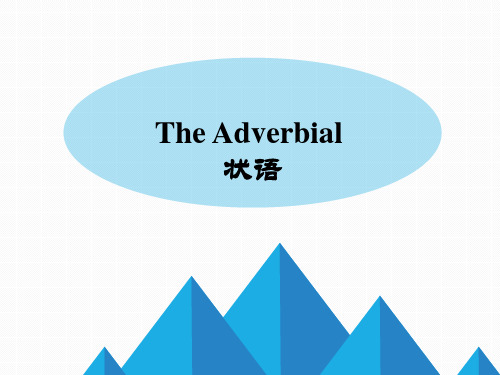
结果状语从句
The problem is so difficult that it will take us time to work it out. 这道题如此难以至于我们要用很多时间才能解决。
She is such a kind girl that everyone likes her. 她非常善良,以至于每个人都喜欢她。
not that...but that...(不是因为...而是因为)
条件状语从句
If you want to succeed, you'd better work hard. 如果你想成功,最好努力工作。 I'll come unless it rains. 除非下雨,否则我一定来。 You can borrow the book as long as you promise to keep i Ming studied so hard that he caught up with the others very quickly. 李明学习如此努力,结果很快赶上了其他人。
6.程度状语: I nearly forgot what he had promised. 我几乎忘记了他答应的事。
(2)如果动词前有一个或几个助动词,状语位于第一个 助动词之后。 He has already had his lunch.他已吃过午饭了。
(3)如果动词是be,状语就放在be动词之后。 He is always at home. 他总是在家。
3.状语位于句末,这是状语的通常位置。
We get up at six in the morning. 我们早晨六点起床。
三、状语的分类:
状语按用途可分为:地点、时间、原因、目的、 结果、条件、让步、程度、方式、伴随情况等几类。
英语时间状语从句讲解与练习(完整版)

英语时间状语从句讲解与练习英语时间状语从句讲解与练习when, while 和as 引导时间状语从句的用法这三个词的意思很简单,都有“当……时候”的意思。
但学生经常会问三个词的区别在哪儿,特别是在做选择题的时候。
别说是学生,就我个人而言,做这样的选择题要保证百分之百的正确也是不可能的。
现根据大量的实例和个人的思考,做一点小结,供大家参考。
一、when 的用法如果只从现象来看,when 从句用的最多的是一般过去时,而主句的时态没有限制,根据具体情况而定。
1. When he was a child he was always trying out new ideas.他小时候就常常试验一些新的设想。
2. When she came into my room, I was just reading a book. 她走进我房间时,我正在看书。
3. Were you writing when the teacher came in? 老师进来的时候,你在写信吗?4. Sorry, I was out when you called me. 对不起,你打电话来的时候我出去了。
5. He was on the point of leaving when someone knocked at the door.他正要走,这时有人敲门。
6. I thought of it just when you opened your mouth. 就在你要说话的时候,我也想到了。
7. I had hardly[scarcely] closed my eyes when someone knocked at the door.我刚一闭上眼,就有人在敲门了。
根据以上的例句,我们可以总结出一点:when 从句的A 事件,相当于另一个事件B发生的时间点。
也就是说,when 从句的重点不在动作本身发生的状态,而只是把它作为一个时间点,所以when 多数情况下用的是一般过去时,则不用正在进行时。
初中英语状语从句讲解及练习.doc
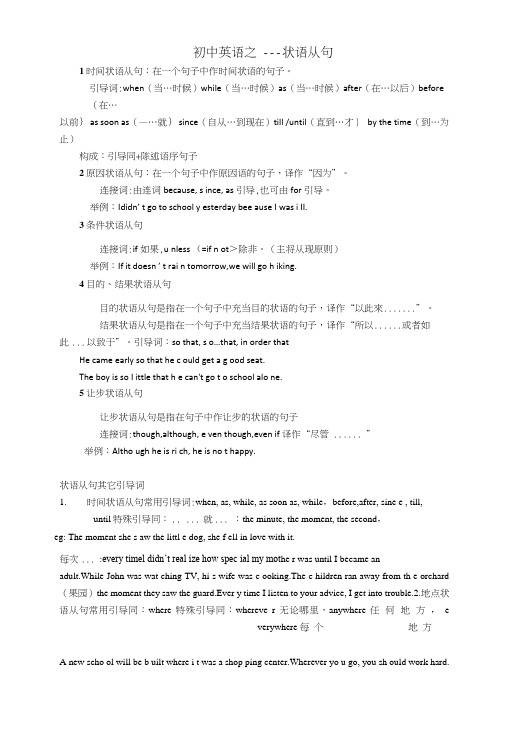
初中英语之 --- 状语从句1时间状语从句:在一个句子中作时间状语的句子。
引导词:when(当…时候)while(当…时候)as(当…时候)after(在…以后)before(在…以前} as soon as(—…就} since(自从…到现在)till /until(直到…才}by the time(到…为止)构成:引导同+陈述语序句子2原因状语从句:在一个句子中作原因语的句子,译作“因为”。
连接词:由连词because, s ince, as引导,也可由for引导。
举例:Ididn’ t go to school y esterday bee ause I was i II.3条件状语从句连接词:if如果,u nless (=if n ot>除非。
(主将从现原则)举例:If it doesn ’ t rai n tomorrow,we will go h iking.4目的、结果状语从句目的状语从句是指在一个句子中充当目的状语的句子,译作“以此來.......”。
结果状语从句是指在一个句子中充当结果状语的句子,译作“所以......或者如此... 以致于”。
引导词:so that, s o…that, in order thatHe came early so that he c ould get a g ood seat.The boy is so I ittle that h e can't go t o school alo ne.5让步状语从句让步状语从句是指在句子中作让步的状语的句子连接词:though,although, e ven though,even if 译作“尽管 ...... ”举例:Altho ugh he is ri ch, he is no t happy.状语从句其它引导词1.时间状语从句常用引导词:when, as, while, as soon as, while,before,after, sine e , till,until 特殊引导同:.. ... 就... :the minute, the moment, the second,eg: The moment she s aw the littl e dog, she f ell in love with it.每次... :every timel didn’t real ize how spec ial my mot he r was until I became anadult.While John was wat ching TV, hi s wife was c ooking.The c hildren ran away from th e orchard (果园)the moment they saw the guard.Ever y time I listen to your advice, I get into trouble.2.地点状语从句常用引导同:where特殊引导同:whereve r无论哪里,anywhere 任何地方,everywhere 每个地方A new scho ol will be b uilt where i t was a shop ping center.Wherever yo u go, you sh ould work hard.状语从句练习单项选择1.John does n't letever ybodyinthe kitchen __________ h e could makehis sur prisedinner fortheparty.A. which B. when C. so that D. as if 2.I wouldt hankit __________ you call back this a fternoon for the doctor5 smeeting.A.until B. if C. when D. that3.Asfar as Iam concerned (就我而言),education is about learning and the more you learn,—____ A. the betterlife will you get B. the betterlife you will ge tC. you will get the bet ter lifeD.will you get the bet ter life4.Af ter the war, a new school wasbuilt _____________ t here had once be en(曾经有)a theatre.A. that B. where C . which D. whe n5.—Is Mr.Smith in the office?—Yes , __________ he is in charg e of the office, he mustbe there.A.since B. how ever C. whether D. for 6.As your good friendJ will do ____________help you.A. that I can to B. what I canto C. all that I can D. what I can7.Someone called me up in the middle ofthe night, b ut they hung up(挂断电话)____________ I coul d answer the phone.A.as B.since C. until D. before8.We must hurry up __________catchup with the last train.A. that B. so that to C. in order that D. in ord er toLondon 9.No m atter ________ h ard it ma y be, I will carry it out .A. what B. whatev er C.how D. however 1 0. _________you may do, you must do itwell.A. Which B.Whenever C. What ever D.WhenM. ________ you are so weak, you’d better sta y at home.A.Since B. For C. B ecause D. Though 1 5.1saw Mr.Smith last S unday. We had not seen each other ____________ I left .A. as B. before C.since D. till 16.1’11 be back before you ________ .A.will leave B will have left C.leave D. would lea vel7.If the weather ____________ tomor row, we will go picnic i n the centra 1 park.A wil 1 be fine Bis fine Cis going to be fine D h ave been fine18. ________________________ They wen t on working it was late at night.A. eve n if B.as if C. however D. as tho ughl9.l hurr ied _____________ I wouldn't b e late for c lass.A. sine e B. sotha t C.as if D . unless20.T he volleybal I match will be put off if it __________ .A. will r ain B. rain s C. r ained D. is raining【实例解析】1.(2004年北京市海淀区中考试题)You will sta y healthy ________ you do more exerci se, such as running and walking.A.ifB. howC. beforeD. where2.(2004年江丙省中考试题)…Shall we go on wor king?Ye s, _________ I prefer to have a rest.A. whenB. ifC. be causeD. th ough3.(2004年徐州市中考试题)N one of us kn ew what had happened ___________ they told us abo ut it.A. w henB. unti IC. afterD. though4.(2004年泉州市中考试题)••-1 ho pe you’ll en joy your tri p, dear!—Thank you,mum. Til gi ve you a cal I ___________ I get there.A. untilB. as soon a sC. sinceD. till【中考演练】一.单项填空1. ______ he z s old, he c an still car ry this heav y bag.A. T houghB. Si neeC. ForD. So2.•■-Do you know if he ______ to play ba sket ball wi th us?---1 think he wi II come if h e _______ fre e tomorrow.A. comes; i sB. comes;will beC.will come;isD. will come; will b e3.In the z oo if a chil d _____ into the water a nd can't swi m, the dolph ins may come up _________ him.A. will fall; to he IpB. fall s; to helpC. will fall; help D . falls; hel ping4.1don z t remember _________ he worked in th at city when he was youn g.A. whatB. which C . where D.who5.We wil I stay at ho me if my aunt __________ to visit us t omorrow.esB. c omeC. will comeD. is coming6.Th e police ask ed the child ren _______ cross the st reet _________ the traffi c lights tur ned green.A. not; befo reB. don't; whenC. n ot to; untilD. not; af ter7.1was late for cla ss yesterday ________ t he re was somet hing wrong w ith my bike.A. when B . that C. u ntil D. bee ause8.I’ll go swimming with you if I _________ f ree tomorrow .A. will b eB. shall beC. am D . was9.In t he exam, the ________ yo u are, _______ the ________ mistakes y ou will make .A. carefu I; littleB. more ca reful; fewes tC. more c areful; fewe rD. more c a ref u I; less10.You shou Id finish yo ur lessons _______ you g o out to pal y.A. beforeB. afterC. whenD.while11.1hurried _____ I wouldn't be late for class.A.sinceB. s o thatC. a s ifD. uni ess12.When you read the book, you'd better make a mark ________ you have any questio ns.A. whi chB. thatC. where D . though13.The teacher raised his v oice ________ a ll the stu dents could hear him.A. forB. s o thatC. b ecauseD. i n order14.H e took off h is coat ________ h e felt hot.A. be causeB. asC. ifD.since15.It is ______ th at we'd like to go out f or a walk.A. a lovely dayB. t oo lovely a dayC. so lovely a dayD. such Io vely a day16 . Mary had _______ m uch w ork to do th at she staye d at her off ice all day.A. suchB.soC. tooD. very17.______ I fel t very tired , I tried to finish the work.A. AlthoughB.BecauseC.AsD. As if18.______ t he day went on, the weat her got wors e.A. WithB. SinceC. WhileD.As19.______ well you c an drive, yo u must drive carefully.A. So long asB.ln order tha tC. No ma tter how D . The momentBeijing20. Write to me as soon as you _________ to.A . will get B. get C. g etting D. g ot二.根据中文意思完成下列英语句子1.不管他跟我开什麽玩笑,我都不生气。
状语从句 讲解及练习

状语从句状语从句在句中作状语,修饰动词、形容词或副词等。
状语从句有九种,可以用来表示时间、条件、原因、地点、目的、结果、让步、方式、比较等意义。
一、状语从句的连接词。
⑴时间状语从句①连接词: when, while, as, as soon as, since, until, after, before, whenever②例句: I want to see him as soon as he arrives.Whenever he comes, he brings a friend.⑵条件状语从句①连接词: if, unless, as long as(只要)②例句: Unless you study harder you will never pass the examination.As long as I am alive, I will go on studying.⑶原因状语从句①连接词: as, because, since②例句: As the rain had stopped, we went on working.Since we live near the sea, we enjoy a healthy climate.⑷地点状语从句①连接词: where (在…的地方)②例句: Where there is smoke, there is fire.Put it where we can all see it.⑸目的状语从句①连接词: so that, in order that②例句: Finish this so that you can start another.He set out early in order that he might arrive in time.⑹结果状语从句①连接词: so that, so…that, such…that②例句: The bus broke down, so that we had to walk.He was so angry that he couldn’t speak.He is such a good teacher that we all love him.⑺让步状语从句①连接词: though, although, even if, however②例句: Although/Though he is in poor health, he works hard.Even if it rains cats and dogs, I’ll go.⑻方式状语从句①连接词: as, as if②例句: He does as the doctor advises.I will do it as you tell me.⑼比较状语从句①连接词: than, as…as, not so…as, the more…the more②例句: The work is not as easy as I thought.Actions speak louder than words.The more I look at the picture, the better I like it.二、易混连接词区分。
状语从句讲解及练习
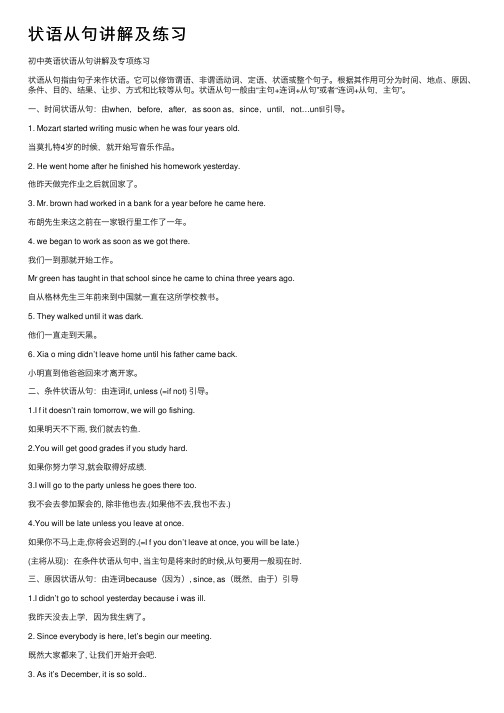
状语从句讲解及练习初中英语状语从句讲解及专项练习状语从句指由句⼦来作状语。
它可以修饰谓语、⾮谓语动词、定语、状语或整个句⼦。
根据其作⽤可分为时间、地点、原因、条件、⽬的、结果、让步、⽅式和⽐较等从句。
状语从句⼀般由“主句+连词+从句”或者“连词+从句,主句”。
⼀、时间状语从句:由when,before,after,as soon as,since,until,not…until引导。
1. Mozart started writing music when he was four years old.当莫扎特4岁的时候,就开始写⾳乐作品。
2. He went home after he finished his homework yesterday.他昨天做完作业之后就回家了。
3. Mr. brown had worked in a bank for a year before he came here.布朗先⽣来这之前在⼀家银⾏⾥⼯作了⼀年。
4. we began to work as soon as we got there.我们⼀到那就开始⼯作。
Mr green has taught in that school since he came to china three years ago.⾃从格林先⽣三年前来到中国就⼀直在这所学校教书。
5. They walked until it was dark.他们⼀直⾛到天⿊。
6. Xia o ming didn’t leave home until his father came back.⼩明直到他爸爸回来才离开家。
⼆、条件状语从句:由连词if, unless (=if not) 引导。
1.I f it doesn’t rain tomorrow, we will go fishing.如果明天不下⾬, 我们就去钓鱼.2.You will get good grades if you study hard.如果你努⼒学习,就会取得好成绩.3.I will go to the party unless he goes there too.我不会去参加聚会的, 除⾮他也去.(如果他不去,我也不去.)4.You will be late unless you leave at once.如果你不马上⾛,你将会迟到的.(=I f you don’t leave at once, you will be late.)(主将从现):在条件状语从句中, 当主句是将来时的时候,从句要⽤⼀般现在时.三、原因状语从句:由连词because(因为), since, as(既然,由于)引导1.I didn’t go to school yesterday because i was ill.我昨天没去上学,因为我⽣病了。
英语时间状语从句讲解与练习(完整版)

英语时间状语从句讲解与练习英语时间状语从句讲解与练习when, while 和 as 引导时间状语从句的用法这三个词的意思很简单,都有“当……时候”的意思。
但学生经常会问三个词的区别在哪儿,特别是在做选择题的时候。
别说是学生,就我个人而言,做这样的选择题要保证百分之百的正确也是不可能的。
现根据大量的实例和个人的思考,做一点小结,供大家参考。
一、when 的用法如果只从现象来看,when 从句用的最多的是一般过去时,而主句的时态没有限制,根据具体情况而定。
1. When he was a child he was always trying out new ideas. 他小时候就常常试验一些新的设想。
2. When she came into my room, I was just reading a book. 她走进我房间时,我正在看书。
3. Were you writing when the teacher came in 老师进来的时候,你在写信吗?4. Sorry, I was out when you called me. 对不起,你打电话来的时候我出去了。
5. He was on the point of leaving when someone knocked at the door. 他正要走,这时有人敲门。
6. I thought of it just when you opened your mouth. 就在你要说话的时候,我也想到了。
7. I had hardly[scarcely] closed my eyes when someone knocked at the door. 我刚一闭上眼,就有人在敲门了。
根据以上的例句,我们可以总结出一点:when 从句的A事件,相当于另一个事件B发生的时间点。
也就是说,when 从句的重点不在动作本身发生的状态,而只是把它作为一个时间点,所以when 多数情况下用的是一般过去时,则不用正在进行时。
八年级下册状语从句讲解及练习

八年级下册状语从句讲解及练习状语从句是用来修饰主句中的动词、副词和形容词的从句。
根据含义,状语从句可以分为时间状语从句、地点状语从句、条件状语从句、原因状语从句、结果状语从句、比较状语从句、目的状语从句和让步状语从句。
时间状语从句通常由when、as、while、before、after、since、till、until、as soon as等连词引导。
例如,昨天我到学校时正下着大雨。
他正在做作业时电话响了。
在时间状语从句中,通常不使用将来时态,而是使用现在时态表示将来的动作或状态。
例如,我一到纽约就给你打电话。
在带有till或until引导的时间状语从句的主从复合句中,如果主句用肯定式,其含义是“一直到……时”,谓语动词只能用延续性动词。
如果主句用否定式,其含义是“直到……才……”、“在……以前不……”,谓语动词可用瞬间动词。
例如,年轻人看书看到灯灭了。
让我们等到雨停了再走。
条件状语从句通常由if和unless引导。
例如,如果明天下雪了,我们该怎么办?除非我告诉你,否则不要离开大楼。
在条件状语从句中,谓语动词通常使用现在时态表示将来的动作或状态。
例如,如果明天有空,我会帮你学英语。
除非他病了,否则他不会迟到。
祈使句+ and (or)+陈述句”在意思上相当于一个带有条件状语从句的复合句。
例如,赶快,否则你会迟到。
如果你不赶快,你会迟到。
努力研究,你就能通过考试。
If you work hard。
you will XXX.XXX like because。
since。
and as。
For example。
"He didn't come to school because he was ill." As and since are weaker than because and are often used to express XXX "why," only because can be used。
(完整版)初中状语从句讲解及习题附答案
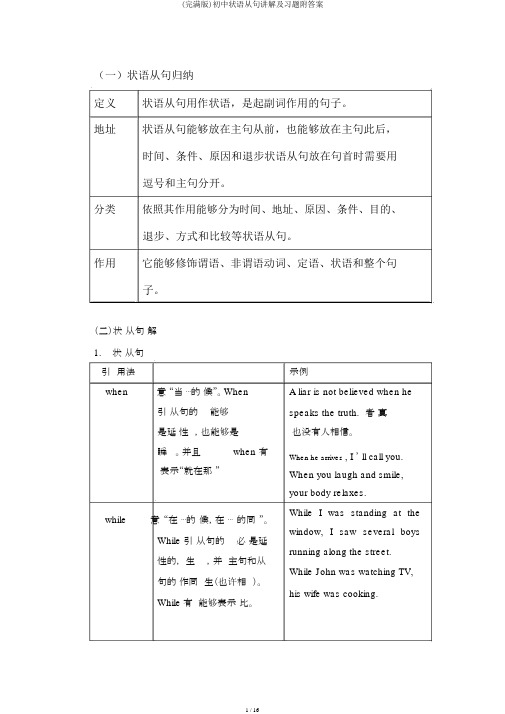
(一)状语从句归纳定义状语从句用作状语,是起副词作用的句子。
地址状语从句能够放在主句从前,也能够放在主句此后,时间、条件、原因和退步状语从句放在句首时需要用逗号和主句分开。
分类依照其作用能够分为时间、地址、原因、条件、目的、退步、方式和比较等状语从句。
作用它能够修饰谓语、非谓语动词、定语、状语和整个句子。
(二)状从句解1.状从句引用法when意“当⋯的候”。
When引从句的能够是延性,也能够是瞬。
并且when 有表示“就在那”while意“在⋯的候,在⋯ 的同”。
While 引从句的必是延性的,生,并主句和从句的作同生(也许相)。
While有能够表示比。
示例A liar is not believed when he speaks the truth.者真也没有人相信。
When he arrives , I’ll call you. When you laugh and smile, your body relaxes.While I was standing at the window, I saw several boys running along the street.While John was watching TV, his wife was cooking.as意“一⋯ 一⋯”。
As 引的作是延性的,生短,一般用于主句和从句作同生; as 也能够一前一后。
after意“在⋯此后”。
表示主句作生在从句作此后。
主句与从句的作关系与before 引的从句相反。
before意“在⋯从前”。
引的从句不用否定形式的,并且当 before 引的从句位于主句此后,有成“就,才”。
当主句用将来,从句是用在;若是 before 引的从句用的是去,主句多用去完成,以便体作的先后。
till意“直到”。
一般情况下能够和 until 互。
若是主句中的是瞬,必用否定形式;若是主句中的是The writer was angry as he was travelling on a train to London because someone had invaded his “ space ”.He smiled as he stood up.With many hungry visitors waiting, don’stay too long at your table after you have finished.If an early exit is necessary, you can leave after a scene is over.You can ’ t watch TV before you finish your homework.Before it ended, the theatrewas almost empty.My father had left for Canada just before the letter arrived.She didn ’event know that it was an earthquake till she saw a shaking ( moving from side to side) light.The fireman worked very hard延性,用必定和否定形式都能够,但表达的意思不相同。
(完整版)初中时间状语从句语法及练习

英语时间状语从句讲解(一)when, while 和as 引导时间状语从句的用法一、when 的用法如果只从现象来看,when 从句用的最多的是一般过去时,而主句的时态没有限制,根据具体情况而定。
1. When he was a child he was always trying out new ideas.3. Were you writing when the teacher came in? 老师进来的时候,你在写信吗?4. Sorry, I was out when you called me. 对不起,你打电话来的时候我出去了。
when 从句的重点不在动作本身发生的状态,而只是把它作为一个时间点,所以when 多数情况下用的是一般过去时,则不用正在进行时。
因为如果用正在进行时,它表示的就是一段时间而不是一个时间点了。
根据这一点,有的文章补充说:when 从句的动词大多是瞬时动词。
这种说法也可以参照。
实际上,when 从句也可以有其它的时态,但几乎也不用进行时,因为它也只是作为一个时间参照点。
例如:2. When he had finished his homework, he took a short rest.3. Why do you want a new job when you have got such a good one already?二、while 的用法相比于when 来说,while 从句的侧重点就不一样了。
while 从句的侧重点在于描述动作正在发生的状态,它的意思是:当while 事件正在发生的时候,另一件事如何如何。
所以,while 从句一般用的是正在进行时。
而另一件事的状态没有硬性的要求,根据具体情况而定。
例如:1. While my wife was reading the newspaper, I was watching TV.2. While Jim was mending his bike, Lin Tao came to see him.3. While they were talking, the bell rang. 正在他们谈话的时候,上课铃响了。
人教版英语八下状语从句讲+练

八下状语从句:一个完整的句子修饰主句中的动词、形容词/副词或这个大句子等,充当状语的成分。
起副词作用的句子(故也叫副词性从句)。
根据其作用可分为时间、地点、原因、条件、目的、结果、让步、方式和比较等从句。
状语从句一般由连词(从属连词)引导,也可由词组引导。
从句位于句首或句中时常用逗号与主句隔开,位于句尾时可以不用隔开。
一:时间状语从句在时间状语从句中,由状语从句表示主句动作发生的时间。
要点:时间状语从句,由以下连词引导:when(在…时), as(当…时), while(在…期间), before(在…之前), after(在...之后), since (自从...以来), not...until(直到…才)until/till(直到…时)等特殊引导词:the minute, the moment, the second,the day,every time,no sooner… than(一...就...), hardly…when(一...就...), as soon as(一…就…)。
在时间状语从句中,要注意时态一致。
一般情况下主句是将来时的时候,从句主要用一般现在时。
当含有否定意义的连接词如:no sooner…than,hardly…when作为引导词且位于句首时,从句要部分(半)倒装。
No sooner did I go to the park,than I saw him waiting for meHardly had we started when it began to rain.No sooner had I arrived home than it began to rain. 我一到家就开始下雨了。
Every time I listen to your advice, I get into trouble. 每当我听取你的建议时,我就会惹上麻烦。
二:原因状语从句由连词because, since, as引导, 也可由now that 等词引导。
专题05 时间状语从句-八年级英语下期末专项复习(仁爱版)

专题05 时间状语从句第一部分语法1. 引导时间状语从句的连词2. when,while,as引导时间状语从句的区别when,while,as显然都可以引导时间状语从句,但用法区别非常大。
①when可以和延续性动词连用,也可以和短暂性动词连用;而while和as只能和延续性动词连用。
Why do you want a new job when you’ve got such a good one already?你已经找到如此好的工作,为何还想再找新的?(get为短暂性动词)Sorry, I was out when you called me.对不起,你打电话时我刚好外出了。
(call为短暂性动词)Strike while the iron is hot.趁热打铁。
(is为延续性动词,表示一种持续的状态)The students took notes as they listened.学生们边听课边做笔记。
(listen为延续性动词)②when从句的谓语动词可以在主句谓语动作之前、之后或同时发生;while和as从句的谓语动作必须是和主句谓语动作同时发生。
a. 从句动作在主句动作前发生,只用when。
When he had finished his homework, he took a short rest. (finished先发生)当他完成作业后,他休息了一会儿。
When I got to the airport, the guests had left. (got to后发生)当我赶到飞机场时,客人们已经离开了。
b. 从句动作和主句动作同时发生,且从句动作为延续性动词时,when,while,as都可使用。
①When / While / As we were dancing, a stranger came in. (dance为延续性动词)当我们跳舞时,一位陌生人走了进来。
②When / While / As she was making a phonecall, I was writing a letter. (make为延续性动词)当她在打电话时,我正在写信。
状语从句讲解及练习题50题-有答案
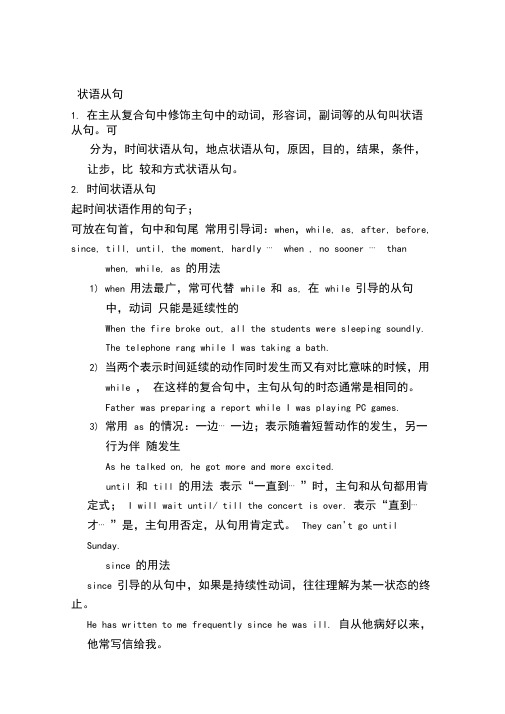
状语从句1.在主从复合句中修饰主句中的动词,形容词,副词等的从句叫状语从句。
可分为,时间状语从句,地点状语从句,原因,目的,结果,条件,让步,比较和方式状语从句。
2.时间状语从句起时间状语作用的句子;可放在句首,句中和句尾常用引导词:when,while, as, after, before, since, till, until, the moment, hardly ⋯when , no sooner ⋯than when, while, as 的用法1)when 用法最广,常可代替while 和as, 在while 引导的从句中,动词只能是延续性的When the fire broke out, all the students were sleeping soundly.The telephone rang while I was taking a bath.2)当两个表示时间延续的动作同时发生而又有对比意味的时候,用while ,在这样的复合句中,主句从句的时态通常是相同的。
Father was preparing a report while I was playing PC games.3)常用as 的情况:一边⋯一边;表示随着短暂动作的发生,另一行为伴随发生As he talked on, he got more and more excited.until 和till 的用法表示“一直到⋯”时,主句和从句都用肯定式;I will wait until/ till the concert is over. 表示“直到⋯才⋯”是,主句用否定,从句用肯定式。
They can't go untilSunday.since 的用法since 引导的从句中,如果是持续性动词,往往理解为某一状态的终止。
He has written to me frequently since he was ill. 自从他病好以来,他常写信给我。
(完整版)初中时间状语从句语法及练习(全)

状语从句什么是状:句子中修、形容等的句子成分叫状,用来从地点、、原因、目的、果、条件、步、比、方式和陪同情况等方面修明。
e.g. He speaks English very well(.副作状)e.g. He is playing under the tree(.介短作状)e.g. I come specially to see you(.不定式作状)e.g. If I am not busy tomorrow,I will play football with you.(从句作状)e.g. Having had a quarrel with his wife,he left home in a bad temper(.分作状)状从句:状从句就是在复合句里起状作用的从句,能够表示、地点、原因、目的、果、步、比、方式、条件等。
引状从句的叫做隶属。
状从句的位置能够在句首,也能够在句末。
放在句首,从句后边常用逗号与主句分开;放在句末,从句前面常常不用逗号。
If it ’ s fine tomorrow, I wilgo with you.I will go with you if it’ s fine tomorrow.状从句分:1、状从句2、地点状从句3、原因状从句4、目的状从句5、果状从句6、条件状从句7、步状从句8、比状从句9、方式状从句状从句隶属:when, while, as, before, after, till/until, since, whenever, as soon as(一⋯⋯就)⋯⋯:主将从,主情从,主祈从一、 When/while/as (当⋯候)区:主句作与从句作生的(同/以前 /此后);从句(延性 /瞬性)1)When:when 引状从句表示“当⋯⋯ 的候”,when既能够指段也可指点,从句中既可用延性又可用瞬性,且作既可和主句的作同生又可在主句的作以前或此后生。
且when 引的状从句中一般用一般在表将来(主将从)。
初中英语状语从句详细讲解与练习(精华版)

对比训练 1
1. __A__ he heard this, he got very angry.
2. I met Lucy__B__ I was walking along the river.
3. __C__ a child, he lived in the countryside. A. when B. while C. as
4. 表示“随着…..”.常指一个行为是另一个行为的结果。 As she grew older, she became more beautiful.
while:持续性动词 /进行时
1.一般或现在情况
e.g. I like listening to music while I am doing my homework 2.将来. 情况-V一般现在时或现在进行时 e.g.— I’m going to the post office.
won in the end.
A. After B. before C. when D. then
since引导的时间状语从句
1.常译为“自从……”, 2.主句常用现在完成时,从句常用一般过去时。
1.我们自从分手以后一直没见过面。 We haven’t seen each other since we parted. 常用句型:It has been (is) + 时间段 + since从句
-- While you are there, can you get some stamps for me?
3.过去情况
e.g. I hurt my should while I was doing gym.
When: 1.当…的时候 When I was young, I went to town myself. When he receives the letter, he’ll tell us.
(完整版)初中状语从句讲解和练习附答案
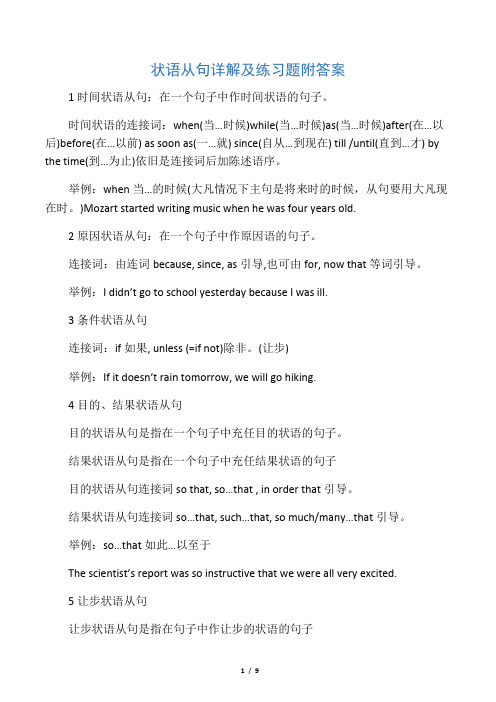
状语从句详解及练习题附答案1时间状语从句:在一个句子中作时间状语的句子。
时间状语的连接词:when(当…时候)while(当…时候)as(当…时候)after(在…以后)before(在…以前) as soon as(一…就) since(自从…到现在) till /until(直到…才) by the time(到…为止)依旧是连接词后加陈述语序。
举例:when当…的时候(大凡情况下主句是将来时的时候,从句要用大凡现在时。
)Mozart started writing music when he was four years old.2原因状语从句:在一个句子中作原因语的句子。
连接词:由连词because, since, as引导,也可由for, now that等词引导。
举例:I didn’t go to school yesterday because I was ill.3条件状语从句连接词:if如果, unless (=if not)除非。
(让步)举例:If it doesn’t rain tomorrow, we will go hiking.4目的、结果状语从句目的状语从句是指在一个句子中充任目的状语的句子。
结果状语从句是指在一个句子中充任结果状语的句子目的状语从句连接词so that, so…that , in order that引导。
结果状语从句连接词so…that, such…that, so much/many…that引导。
举例:so…that如此…以至于The scientist’s report w as so instructive that we were all very excited.5让步状语从句让步状语从句是指在句子中作让步的状语的句子连接词:though, although.,whether…or not举例:Although he is rich, yet he is not happy.状语从句分类1.时间状语从句常用引导词:when, as, while, as soon as, while, before, after, since , till, until分外引导词:theminute,themoment,thesecond,everytime,theday,theinstant,immediately,directly, no sooner … than, hardly …when, scarcely … whenI didn’t realize how special my mother was until I became an adult.While John was watching TV, his wife was cooking.The children ran away from the orchard(果园) the moment they saw the guard.No sooner had I arrived home than it began to rain.Every time I listen to your advice, I get into trouble.2.地点状语从句常用引导词:where分外引导词:wherever, anywhere, everywhereGenerally, air will be heavily polluted where there are factories.Wherever you go, you should work hard.3.原因状语从句常用引导词:because, since, as, since分外引导词:seeing that, now that, in that, considering that, given that, considering that,My friends dislike me because I’m handsome a nd successful.Now that everybody has come, let’s begin our conference.The higher income tax is harmful in that it may discourage people from trying to earn more.Considering that he is no more than 12 years old, his height of 1.80 m is quite remarkable.4.目的状语从句常用引导词:so that, in order that分外引导词:lest, in case, for fear that,in the hope that, for the purpose that, to the end thatThe boss asked the secretary to hurry up with the letters so that he could sign them.The teacher raised his voice on purpose that the students in the back could hear more clearly.5.结果状语从句常用引导词:so … that, so… that, such … that,分外引导词:such that, to the degree that, to the extent that, to such a degree that,He got up so early that he caught the first bus.It’s such a good chance that we must not miss it.To such an degree was he excited that he couldn’t sleep last night.6.条件状语从句常用引导词:if, unless,分外引导词:as/so long as, only if, providing/provided that, suppose that,in case that, on condition thatWe’ll start our project if the president agrees.You will certainly succeed so long as you keep on trying.Provided that there is no opposition, we shall hold the meeting here.7.让步状语从句常用引导词:though, although, even if, even though分外引导词:as(用在让步状语从句中必须要倒装),while (大凡用在句首),no matter …,spite of the fact that, while, whatever, whoever, wherever, whenever, however, whicheverMuch as I respect him, I can’t agree to his proposal.尽管我很尊敬他,我却不同意他的建议。
初中英语状语从句教案及练习讲解
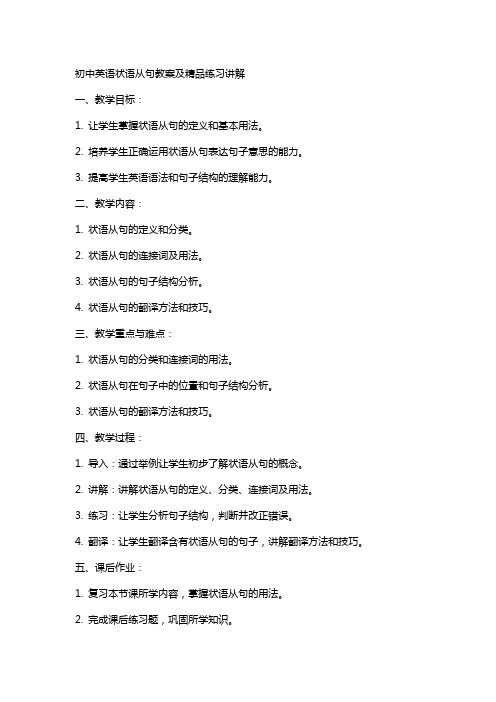
初中英语状语从句教案及精品练习讲解一、教学目标:1. 让学生掌握状语从句的定义和基本用法。
2. 培养学生正确运用状语从句表达句子意思的能力。
3. 提高学生英语语法和句子结构的理解能力。
二、教学内容:1. 状语从句的定义和分类。
2. 状语从句的连接词及用法。
3. 状语从句的句子结构分析。
4. 状语从句的翻译方法和技巧。
三、教学重点与难点:1. 状语从句的分类和连接词的用法。
2. 状语从句在句子中的位置和句子结构分析。
3. 状语从句的翻译方法和技巧。
四、教学过程:1. 导入:通过举例让学生初步了解状语从句的概念。
2. 讲解:讲解状语从句的定义、分类、连接词及用法。
3. 练习:让学生分析句子结构,判断并改正错误。
4. 翻译:让学生翻译含有状语从句的句子,讲解翻译方法和技巧。
五、课后作业:1. 复习本节课所学内容,掌握状语从句的用法。
2. 完成课后练习题,巩固所学知识。
3. 收集含有状语从句的句子,进行翻译和分析。
注意事项:1. 教学过程中要注意举例生动、贴近生活,激发学生的学习兴趣。
2. 针对不同程度的学生,适当调整教学难度,确保教学质量。
3. 注重培养学生的语法分析和运用能力,提高他们的英语水平。
六、教学策略与方法:1. 采用情景教学法,通过设定真实的生活场景,让学生在实际语境中学习和运用状语从句。
2. 使用任务型教学法,设计各种练习任务,让学生在完成任务的过程中掌握状语从句的用法。
3. 采用合作学习法,鼓励学生分组讨论,共同分析句子结构和翻译方法。
4. 运用多媒体教学手段,如PPT、视频等,丰富教学内容,提高学生的学习兴趣。
七、教学评价:1. 课堂表现:观察学生在课堂上的参与程度、发言情况和语法运用准确性。
2. 课后作业:检查学生完成作业的质量,包括语法、句子结构和翻译等方面。
3. 单元测试:定期进行单元测试,评估学生对状语从句知识的掌握程度。
4. 学生互评:鼓励学生相互评价,共同提高英语水平。
八、教学计划:1. 第一周:讲解状语从句的定义和分类。
状语及状语从句(语法加练习完整讲解)教学提纲

6.名词(短语): Wait a moment.等一会儿。 It can go all day and all night. 它能整日整夜地走。
7.状语从句: I'll write to you as soon as I get there. 我一到那儿就给你写信。 He didn't come because he had to stay at home to finish his home work. 他没来,因为他不得不留在家里完成家庭作业。
The Adverbial 状语
一、什么是状语
修饰动词、形容词、副词或整个句子,说明动作或 状态特征的句子成分,叫做状语。
1. 状语修饰动词 Silently she went away. 她悄悄地走开了。
2. 状语修饰句子 Sadly, he will not be there. 令人伤心的是,他将不会在那里了。
5. 如果句末状语太多, 可调一个(不得超过一个)到句首。 如果有时间状语,通常将时间状语放于句首。
Yesterday morning Wang Lin was drawing a horse carefully with a brush on a piece of paper in our classroom. 昨天上午王琳在我们教室里用笔细心地在一张纸上画马。
3)this 和 that 也可以作状语去修饰形容词和副词 Do I look that stupid? 我看起来有那么傻吗? I didn't think we'd get this far. 我没想到我们会走这么远。
二、什么可以作状语? 1.副词(短语): Say again.再说一遍。 Suddenly it began to rain.天突然下雨了。
(完整)八年级下册状语从句讲解及练习.docx

状语从句用来修主句中的,副和形容的从句叫状从句。
根据其含状从句可分状从句,地点状从句,条件状从句,原因状从句,果状从句,比状从句,目的状从句,步状从句。
1.状从句(1) 状从句常用when, as, while, before, after, since, till, until, as soon as等来引。
.It was raining hard when got to school yesterday.While he was doing his homework, the telephone rang.(2) 在状从句里,通常不用将来,用在表示将来的作或状。
.I ’ ll ring you up as soon as I get to New York.(3) 在有 till 或 until 引的状从句的主从复合句里,如果主句用肯定式,其含是“一直到⋯⋯”,只能用延性。
如果主句用否定式,其含是“直到⋯⋯才⋯⋯” , “在⋯⋯以前不⋯⋯” , 可用瞬。
.The young man read till the light went out.Let ’ s wait until the rain stops.2.条件状从句(1) 条件状从句通常由if, unless 引。
.What shall we do if it snows tomorrow?Don’ t leave the building unless I tell you to.(2) 在条件状从句里,通常用在表示将来的作或状。
.I ’ ll help you with your English if am free tomorrow.He won ’ t be late unless he is ill.(3) 祈“使句+ and (or)+述句” 在意思上相当于一个有条件状从句的复合句。
.:Hurry up, or you’ ll be late.=If you don’ t hurry up, you’ ll be late.Study hard and you will pass the exam.=If you study hard, you will pass the exam.3.原因状从句(1)原因状从句通常由 because, since, as引。
八年级下英语常用语法知识——状语从句经典练习(含答案解析)(1)

一、选择题1.This my sister and those my brothers.A.is, is B.are, are C.is, are C解析:C【解析】【分析】【详解】句意:这是我姐姐,那些是我哥哥。
考查系动词辨析。
this这个,单指代词,系词需用is;those那些,复指代词,系词需用are;根据句意结构,故选C。
2.— there a map and two posters on the wall?—Sorry, I don’t know.A.Has B.Is C.Have D.Are B解析:B【解析】【详解】句意:——在墙上有一幅地图和两张海报吗?——对不起,我不知道。
考查there be句型。
Has有;Is是;Have有;Are是。
根据第一句中there可知,此处是there be句型的一般疑问句;再根据句中“a map”是可数名词单数形式,there be句型遵循“就近一致”原则,而a map是可数名词单数形式,距离be动词最近,所以此处中be动词使用is。
故选B。
3.—What's on the plate?—There some bread on it.A.is B.are C.has D.have A解析:A【解析】【详解】句意:——盘子上有什么?——有一些面包在上面。
考查There be句型及主谓一致。
is第三人称单数形式;are第二人称单数、第一、三人称复数形式;has第三人称单数形式;have动词原形。
此句是There be句型,并且bread为不可数名词,因此be动词用is。
故选A。
4.This pair of red boots _____________ leather. May I _____________?A.are made of; try them on B.is made of; try it onC.are made of; try it on D.is made of; try them on D解析:D【解析】【详解】句意:这双红靴子是皮革做的,我可以试穿吗考查主谓一致及动词短语。
- 1、下载文档前请自行甄别文档内容的完整性,平台不提供额外的编辑、内容补充、找答案等附加服务。
- 2、"仅部分预览"的文档,不可在线预览部分如存在完整性等问题,可反馈申请退款(可完整预览的文档不适用该条件!)。
- 3、如文档侵犯您的权益,请联系客服反馈,我们会尽快为您处理(人工客服工作时间:9:00-18:30)。
状语从句用来修饰主句中的动词,副词和形容词的从句叫状语从句。
根据其含义状语从句可分为时间状语从句,地点状语从句,条件状语从句,原因状语从句,结果状语从句,比较状语从句,目的状语从句,让步状语从句。
1. 时间状语从句(1) 时间状语从句常用when, as, while, before, after, since, till, until, as soon as 等连词来引导。
It was raining hard when got to school yesterday.While he was doing his homework, the telephone rang.(2) 在时间状语从句里,通常不用将来时态,用现在时态表示将来的动作或状态。
.I 'll ring you up as soon as I get to New York.(3) 在带有till 或until 引导的时间状语从句的主从复合句里,如果主句用肯定式,其含义是直到……时”谓语动词只能用延续性动词。
如果主句用否定式,其含义是直到……才•…在……以前不……”谓语动词可用瞬间动词。
•The young man read till the light went out.Let 's wait until the rain stops.2. 条件状语从句(1) 条件状语从句通常由if, unless 引导。
.What shall we do if it snows tomorrow?Don't leave the building unless I tell you to.(2) 在条件状语从句里,谓语动词通常用现在时态表示将来的动作或状态。
.I 'll help you with your English if am free tomorrow.He won't be late unless he is ill.⑶祈使句+ and (or)+陈述句”在意思上相当于一个带有条件状语从句的复合句。
.: Hurry up, or you 'll be late.=If you don 't hurry up, you 'll be late.Study hard and you will pass the exam.=If you study hard, you will pass the exam.3. 原因状语从句(1)原因状语从句通常由because, si nee, as引导。
.He didn 't come to school because he was ill.As it is raining, we shall not go the zoo.Since you can 't answer the question, I 'll ask someone else.(2)because 表示直接原因,语气最强。
Because 引导的原因状语从句多放在主句之后。
回答由why 提出的问题,只能用because。
As 和since 语气较弱,一般用来表示明显的原因。
由as 和since 引导的原因状语从居多放在句首。
. -------- Why aren ' t going there?---- Because I don ' t want to.As he has no car, he can ' t get there easily.Since we have no money, we can ' t buy it.(3) because 和so 不能同用在一个句子里。
4. 结果状语从句(1) 结果状语从句由so…that, such …that, so引导。
.He is so poor that he can 't buy a bike for his son.She is such a good teacher that everybody likes her.My pencil fell under the desk, so that I couldn 't see it.(2) so …tha语such...that 可以互换。
.在由so...that引导的结果状语从句中,so是副词,与形容词连用。
其结构是:“.so +形容词(副词) + that + 从句”。
He was so glad that he couldn 't say a word.The hall is so big that it can hold 2,000 people.Mother lives so far away that we hardly ever see her.5. 比较状语从句比较状语从句通常由as…as,比较级+ than ••等连词引导。
.Tom runs faster than John does. This classroom is as big as that one.6. 目的状语从句(1)目的状语从句通常由so that, in order that引导。
.We started early so that we could catch the first train.He studies hard so that he could work better in the future.We used the computer in order that we might save time.⑵so that既可引导目的状语从句,又可引导结果状语从句。
区别这两种从句的办法有两个:1 )目的状语从句里往往带有情态动词can, could, may, might 等。
2)从意思上看,目的状语从句往往表示的目的很明确。
.Speak clearly so that they may understand you. ( 目的状语从句)Jack is badly ill so that he has to rest. (结果状语从句)7. 让步状语从句(1)让步状语从句通常由although, though 等连词引导。
Though he is young, he knows a lot.Although I am tired, I must go on working.(2)although(though) 不能用在同一个句子中。
. 我们不能说:Though it was raining hard, but he still went out. 应该说:Though it was raining hard, he still went out. 或It was raining hard, but he still went out.8. 地点状语从句地点状语从句常常由where 来引导。
Go where you like.Where there is a will, there is a way.一. 选择题1. _____ he ' s old, he can still carry this heavy bag.A. ThoughB. SinceC. ForD. So2. ---Do you know if he ______ to play basket ball with us?---I think he will come if he ____ free tomorrow.A. comes; isB. comes; will beC. will come; isD. will come; will be3. In the zoo if a child ____ into the water and can ' t swim, the dolphins m_a_y_ come up ___him.A. will fall; to helpB. falls; to helpC. will fall; helpD. falls; helping4. I don ' t remember ________ he worked in that city when he was young.A. whatB. whichC. whereD. who5. We will stay at home if my aunt ______ to visit us tomorrow.A. comesB. comeC. will comeD. is coming6. The police asked the children _____ cross the street _______ the traffic lights turned green.A. not; beforeB. don ' t; whenC. not to; untilD. not; after7. I was late for class yesterday ______ there was something wrong with my bike.A. whenB. thatC. untilD. because8. I ' ll go swimming with you if I _______ free tomorrow.A. will beB. shall beC. amD. was9. In the exam, the ______ you are, ______ the ______ mistakes you will make.A. careful; littleB. more careful; fewestC. more careful; fewerD. more careful; less10. You should finish your lessons _____ you go out to paly.A. beforeB. afterC. whenD. while11. I hurried ___ I wouldn ate'fort cbleasl s.A. sinceB. so thatC. as ifD. unless12. When you read the book, you ' d better make a mark ____________ you have any questions.A. whichB. thatC. whereD. though13. The teacher raised his voice _____ all the students could hear him.A. forB. so thatC. becauseD. in order14. He took off his coat _____ he felt hot.A. becauseB. asC. ifD. since15. It is ____ that we ' d like to go out for a walk.A. a lovely dayB. too lovely a dayC. so lovely a dayD. such lovely a day16. Mary had ____ much work to do that she stayed at her office all day.A. suchB. soC. tooD. very17. _____ I felt very tired, I tried to finish the work.A. AlthoughB. BecauseC. AsD. As if18. ____ the day went on, the weather got worse.A. WithB. SinceC. WhileD. As19. ____ well you can drive, you must drive carefully.A. So long asB. In order thatC. No matter howD. The moment20. Write to me as soon as you ______ to Beijing.A. will getB. getC. gettingD. got。
